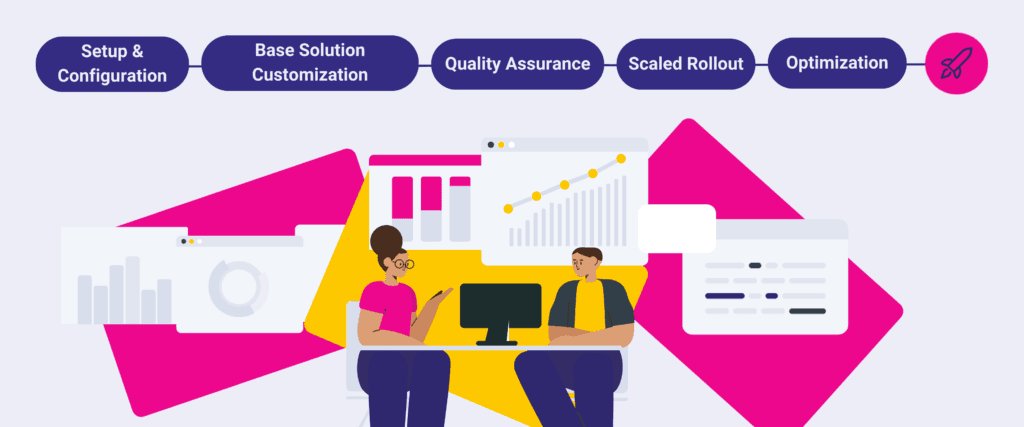We’re living in a digital era. Despite this, the voice channel still holds a pivotal role in customer communication. It defies the forecasts that predicted its importance would wane. Voice calls maintain their status as the most convenient and efficient communication channel. Coupled with new technologies influencing telephony self-service, significant advancements are on the horizon.
Moreover, customer expectations are evolving. They demand swift and efficient service more than ever. At the same time, worries about identity theft have boosted their trust in the voice channel. Businesses are on a mission. They aim to improve customer experience, safeguard personal data, and control costs. In this pursuit, they’re turning to automated voice-based solutions. Telephony self-service is one such solution that’s gaining widespread adoption.
The Importance of Interactive Voice Response (IVR):
Interactive Voice Response (IVR) serves as a key component of telephony self-service, employing touchtone (DTMF) or automated speech recognition (ASR) technologies. IVR performs essential functions, including call routing, caller identification, customer segmentation, and complete customer service interactions without human agent involvement. Implementing IVR enables businesses to reduce costs, improve customer service, and ensure operational efficiency.
Advantages and Disadvantages of Telephony Self-Service:
Telephony self-service offers significant advantages, such as cost reduction, freeing agents from repetitive tasks, shorter queue times, and enhanced customer satisfaction. However, it also presents challenges, including inflexibility, long-winded menus, perceived low customer value, and increased session abandonment rates. To address these drawbacks, businesses should focus on designing user-friendly IVR menus, finding the right balance between self-service and live agent support, and providing clear exit paths to human assistance.
Harnessing Speech Technology and Cloud-Based Solutions:
While DTMF IVR has proven successful, automated speech recognition (ASR) provides greater flexibility and functionality, bridging the gap between digital and voice interactions. Despite initial cost and ongoing support considerations, cloud-based solutions offer an alternative by reducing upfront investment and providing on-demand access to telephony resources. These solutions overcome capital investment hurdles and offer operational flexibility without additional costs for system upgrades.
Unlocking the Potential of Telephony Self-Service:
Telephony self-service adoption varies across sectors, with finance and the public sector leading the way. Large contact centers are more likely to offer telephony self-service compared to mid-sized and small centers. On average, about 33% of calls are handled entirely through self-service without agent involvement. However, not all calls are suitable for self-service, as complex inquiries or customer preferences for human assistance may require live agent support.
Enhancing Customer Adoption and Experience:
Introducing OpenQuestion, an advanced AI IVR solution for smart call routing and contact center transformation. Powered by Teneo, OpenQuestion streamlines customer interactions and improves operational efficiency with its easy module installation.
How OpenQuestion Works:

OpenQuestion utilizes cutting-edge AI technology, including Teneo’s Linguistic Modeling Language (TLML)™ and conversational context understanding. By asking the question, “How can I help you today?” OpenQuestion intelligently routes customers to the most suitable agents, reducing average handling time and providing agents with relevant information before they pick up the call.
Cost-Effective and Simple Installation:

OpenQuestion offers a cost-effective and simple installation process. Its subscription model ensures you pay only for what you use, based on a basic fixed cost and call volumes.
The Impact of OpenQuestion:
Numerous organizations have experienced significant benefits after implementing OpenQuestion.
A global top 5 tech company projected a $39 million return on investment, along with a 30% reduction in misrouted calls and a 2-minute decrease in average handling time.
OpenQuestion replaced failing keypad navigation, improving overall customer satisfaction.
OpenQuestion vs. Traditional IVR:

Traditional IVR systems rely on generalized number menus that often fail to provide callers with relevant options. They also lack the ability to provide specific call information to agents before the call is answered, resulting in prolonged handling times and subpar customer experiences. OpenQuestion addresses these limitations by leveraging advanced AI technology to understand caller intent and provide a range of intelligent automated handling options.

OpenQuestion Functionalities:
- Accuracy Booster: OpenQuestion leverages advanced AI techniques to interpret caller intent accurately.
- Agent Connect: OpenQuestion swiftly routes customer calls to the most suitable agents, providing them with relevant request details in advance.
- Future Proof: OpenQuestion is designed for platform independence, allowing seamless integration with existing technology infrastructure.
- Seamless Integration: OpenQuestion easily integrates with various platforms, including Amazon Connect, Genesys Cloud CX, Google Cloud, Microsoft.
- Feedback Insight: OpenQuestion provides valuable feedback insights to optimize performance and enhance customer experience.
- Data Security: OpenQuestion prioritizes data security, ensuring the protection of sensitive customer information.
- Rapid Deployment: OpenQuestion offers rapid deployment, enabling quick implementation and transformation of contact centers.
- Call Insight: OpenQuestion provides actionable insights into call data, helping businesses make informed decisions.
Transforming Contact Centers and Telephony Self-Service:

OpenQuestion, connected with the latest Azure and OpenAI generative AI technologies, empowers businesses to transform their contact centers into dynamic, manageable, and adaptable operations.
Swisscom, Europe’s largest contact center, achieved major growth by implementing OpenQuestion. They experienced a 21% increase in correct transfers, an 18-point rise in tNPS (transactional Net Promoter Score), and successfully handled 9 million calls per year in 4 languages.
Telephony self-service, powered by advanced technologies like OpenQuestion, offers businesses the opportunity to enhance customer experience, protect sensitive data, and reduce costs.
By leveraging IVR, speech recognition, and cloud-based solutions, organizations can streamline their customer interactions and optimize operational efficiency. Implementing OpenQuestion as an AI-driven IVR solution ensures accurate call routing, improved agent connectivity, and customer satisfaction.
Embrace the transformative power of telephony self-service and take your contact center to new heights with OpenQuestion.

